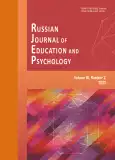Features of socio-psychological adaptation of young people with emotional disorders to the conditions of professional education
- Authors: Kalashnikova O.V.1
-
Affiliations:
- Branch of the Russian State Professional Pedagogical University in Nizhny Tagil
- Issue: Vol 16, No 2 (2025)
- Pages: 536-554
- Section: Psychological Studies
- Published: 30.04.2025
- URL: https://journal-vniispk.ru/2658-4034/article/view/302894
- DOI: https://doi.org/10.12731/2658-4034-2025-16-2-816
- EDN: https://elibrary.ru/NXVDUM
- ID: 302894
Cite item
Full Text
Abstract
Background. The problem of socio-psychological adaptation of young people with emotional disorders to the conditions of professional training is actualized, the solution of which will contribute to the harmonization of students` internal states and create conditions for improving the quality of professional training.
Objective. The purpose of the article is to present the results of research activities aimed at analyzing psychological and pedagogical conditions that can effectively solve the problems of socio-psychological adaptation of young people with emotional disorders to the conditions of professional training. The authors aim to present the experience of implementing a model of psychological and pedagogical support for young people with emotional disorders at the stage of adaptation to professional training conditions.
Methods are based for research activities, which analyzes the psychological and pedagogical conditions that increase the level of socio-psychological adaptation to the conditions of vocational training for young people with emotional disorders and correctional work aimed at overcoming the difficulties of student development in the process of psychological and pedagogical support at the university.
Results. Psychological and pedagogical conditions have been identified that allow solving the problems of socio-psychological adaptation of young people with emotional disorders to the conditions of professional training. The results of experimental research work are presented which make it possible to identify the dynamics in the manifestation of emotional disorders and the influence of certain methods of psychological and pedagogical influence on them in order to harmonize the internal state.
The scope of the results. The results of the study can be used in the course of psychological and pedagogical support at the stage of adaptation to the conditions of professional training, as well as in the course of educational activities. The obtained results can become the basis for the realization of self-development and self-improvement of young people.
About the authors
Olga V. Kalashnikova
Branch of the Russian State Professional Pedagogical University in Nizhny Tagil
Author for correspondence.
Email: olga@yandex.ru
ORCID iD: 0000-0002-9968-7871
SPIN-code: 2346-9896
PhD in Psychology, Associate Professor, Head of the Department of Social Work, Management and Law
Russian Federation, 57, Krasnogvardeyskaya Str., Nizhny Tagil, 622031, Russian FederationReferences
- Antipova, O. L. (2016). Practical diagnostic and correction techniques for anxiety-depressive disorders. Journal of Practical Psychologist, (4), 74–85.
- Boldwin, M. V. (2011). Social anxiety and activation of relational knowledge. Bulletin of Personality and Social Psychology, (27), 137–147.
- Blackburn, K. (2023). Psychology of Anxiety. Moscow: Kogito-Tsentr. 154 p.
- Glass, S. R. (2019). Behavioral assessment of social anxiety and social phobia. Clinical Psychological Review, (9), 75–90.
- Gorina, N. V. (2024). Individual approach in working with anxiety-depressive disorders. Journal of Clinical Psychology, (2), 49–61.
- Leahy, R. (2020). Freedom from Anxiety: Defeat Anxiety Before It Defeats You. Saint Petersburg: Piter. 368 p.
- Moskova, M. V. (2018). Personality factors of emotional maladaptation in students during exam periods. Izvestia of A. I. Herzen Russian State Pedagogical University, (49), 136–144.
- Nekhoroshkova, A. N. (2024). The problem of anxiety as a complex psychophysiological phenomenon. Ecology of Human Beings, (6), 47–54.
- Salagar, V. G. (2022). Anxiety-depressive disorder. Clinical Psychology, (6), 128–148.
- Severny, A. A. (2017). Prevention of academic maladaptation associated with borderline depressive disorders in students. Moscow: FLINTA: Nauka. 78 p.
- Solovieva, E. Yu. (2019). Mixed anxiety and depression disorder in general medical practice. Consilium Medicum, 11(2), 61–67.
- Sukhov, A. N. (2023). Psychology of Social Work. Moscow: Knorus. 115 p.
- Tsiring, D. A. (2023). Psychology of Learned Helplessness. Moscow: ACADEMA. 79 p.
- American Psychiatric Association. (2014). Division of Research. Diagnostic and Statistical Manual of Mental Disorders. Arlington, VA, USA: American Psychiatric Publishing. Pp. 134–198.
- Garnefski, N. (2021). Negative life events, cognitive emotion regulation and emotional problems. Personality and Individual Differences, (30), 1311–1327.
Supplementary files










